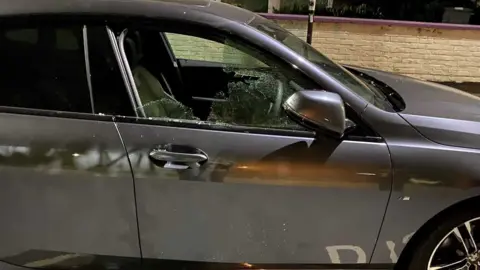Disabled drivers wary of Blue Badge use after thefts
 BBC
BBC"Sometimes... [I think] do I have to park in the disabled space?"
Mary had her Blue Badge stolen from her car and her experience is becoming more common.
There were 1,484 Blue Badge thefts in the year to March 2022, up 41% from 1,055 the previous year, according to BBC analysis of the latest available figures from the Department for Transport (DfT).
Blue Badges were introduced in 1971 and allow disabled people to access priority parking and provide exemptions from some charges.
'I try not to use my Blue Badge'

Mary, 33, from Essex, was at a north London restaurant in August 2021 when someone on a motorbike smashed her car window and took her Blue Badge.
Her health condition, sickle cell disease, means she experiences acute and chronic pain, particularly in her hip and shoulder. This limits her mobility, so a Blue Badge allows her to park in areas closer to her destination.
After the theft, Mary was without her car for two weeks, leaving her feeling "trapped and extremely vulnerable".
She is also upset that someone else is displaying her Blue Badge, showing her name and picture. "They know who I am, they could see me and I have no idea who they are," she said.
Mary says she is now less likely to display her badge. "When I'm going to unfamiliar places like that, I try not to use my Blue Badge. That would be my advice, which is a shame, really, because it's there to be utilised, so that life is easier."
'More reliant on others'
 Andy Fallon
Andy FallonDisability activist Shani Dhanda, 35, from Walsall, has had a Blue Badge since childhood and said she did not realise how much she relied on it until hers was stolen in London in 2017 and again a year later.
Ms Dhanda has brittle bone disease, which causes her bones to frequently break, affecting her ability to move and travel.
After one theft, she had to wait six months for a replacement badge, which took away her independence.
"I was more reliant on others. It left me feeling even more vulnerable and it makes me not want to go out and use my badge, but I have no choice," she said.
Walsall Council said replacement badges should be sent out in seven to 10 days.
'Abuse moves to next area'
Graham Footer, chief executive of charity Disabled Motoring UK, believes the cost-of-living crisis could fuel a further rise in thefts.
"A stolen Blue Badge becomes more attractive, so [people] are prepared to pay hundreds of pounds for them," he said.
The amount saved in parking charges by displaying a Blue Badge varies by region, according to Mr Footer, as do the prosecution rates across UK councils.
"You can save a lot of money in London, and that's where we get a high percentage of badges stolen."
He said some councils were doing a good job at tackling Blue Badge misuse, but this can lead to the problem moving to a neighbouring area with low or no enforcement.
Is there a solution?
When a badge is reported as stolen, council officials can cancel it, while traffic wardens can check a badge's validity at the roadside, according to the DfT.
Mr Footer said the lack of badge inspection by traffic wardens is a factor in why they continue to be stolen, as criminals rely on officials not checking them.
He said one reason is traffic wardens "don't think it's part of their job" to report stolen badges to councils, some of which employ teams dedicated to prosecuting offenders.
"The ability to be able to spot fraud and misuse needs to be a part of [traffic warden] training, in my opinion," he added.
The British Parking Association (BPA), which represents the UK's parking and mobility sector, said while traffic wardens can report the misuse of a badge, the process of recovering one is more difficult. The vehicle's owner must be identified or be present for a badge to be seized.
A BPA spokesperson said, "Fraudulent use, misuse and abuse of the Blue Badge is wrong. Everyone has a role to play in helping to reduce it, including civil enforcement officers [traffic wardens] when managing and enforcing parking rules."
How can thefts be prevented?
Disabled Motoring UK suggests people should only display their Blue Badges when necessary.
It also advises securing badges in vehicles with a Blue Badge protector, which can be locked on to the steering wheel. They range in price, with some costing nearly £50.
Some London councils have introduced companion passes, which work alongside Blue Badges but are tied to a registration plate, rather than an individual. These only work in their designated boroughs.
An LGA spokesperson said: "More councils than ever before are now taking steps to tackle this issue in their communities."
You can listen to the podcast and find information and support on the Access All homepage.

